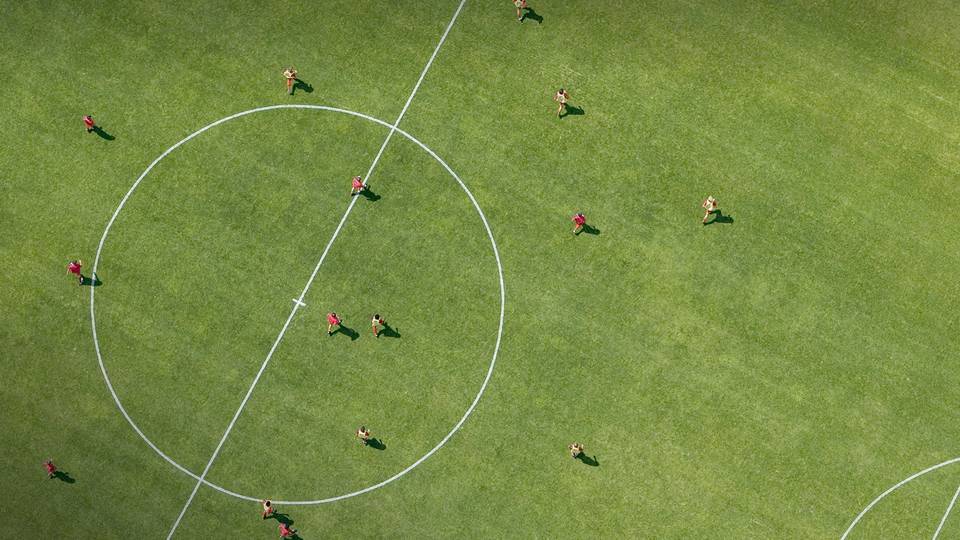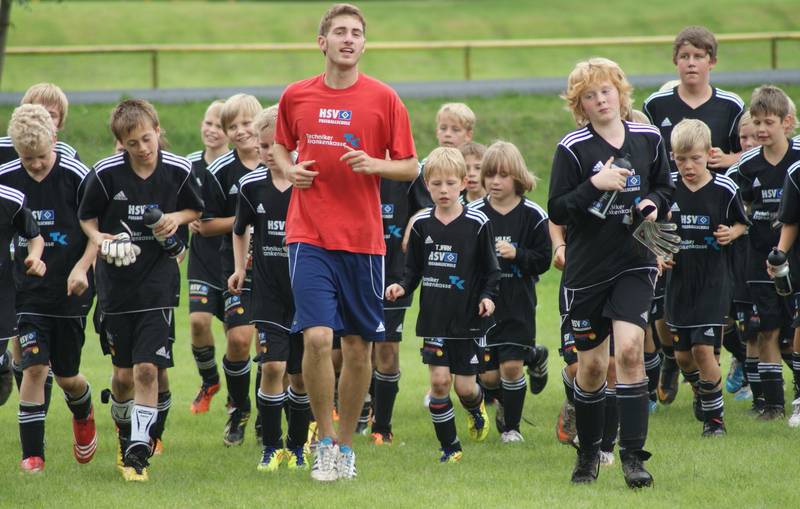Training U11 footballers requires a balanced approach that develops technical skills while maintaining their enthusiasm for the game. At this critical age, young players are ready to advance beyond basic fundamentals and begin understanding tactical elements of football. Coaches working with this age group should focus on creating engaging sessions that improve first touch, turning ability, and positional awareness.
Effective U11 football training combines technical drills with game-like scenarios that challenge players while keeping sessions fun and engaging. Short, focused explanations work best for this age group, as lengthy instructions often exceed their attention spans. Incorporating questions throughout practice helps maintain player engagement and encourages active thinking about tactical situations.
Creating a positive training environment is essential for U11 teams, with sessions typically including a mix of individual skill work and small-sided games. Many coaches find success by designing drills that build confidence through repetition while gradually introducing competitive elements that reflect match situations. This approach helps develop well-rounded young footballers who understand both the technical and tactical aspects of soccer.
Understanding the Basics of U11 Football Training
Training U11 footballers requires a balanced approach that addresses both technical skills and developmental needs. At this crucial age, players are developing foundational abilities while experiencing significant physical and cognitive growth.
The Role of Football in Youth Development
Football offers remarkable developmental benefits for children around age 11. The sport enhances physical fitness through cardiovascular improvement, coordination development, and strength building during training sessions. Regular football practice helps children establish healthy habits and improves their overall wellbeing.
Beyond physical benefits, football cultivates essential life skills. Players learn teamwork and communication by coordinating with teammates during matches and training drills. Problem-solving abilities develop naturally as children make quick decisions during gameplay.
The sport also builds character traits like resilience and discipline. Young players learn to handle both victory and defeat gracefully, while regular training instils commitment and time management skills that benefit them across all areas of life.
Age-Specific Characteristics of U11 Players
U11 players possess distinct developmental traits that coaches must understand to design effective training programmes. At this age, most children experience improved coordination and body control, allowing them to master more complex technical skills like first touches using different foot surfaces.
Cognitively, U11 players can comprehend more sophisticated tactical concepts. They begin understanding basic positional play and simple game strategies. Their attention spans have increased, enabling longer focused training sessions with varied activities.
Socially, these youngsters value peer relationships highly. Group activities and small-sided games work particularly well as they enjoy the social element of football. Competition becomes more meaningful, yet coaches should maintain a healthy balance between competitive elements and skill development.
Physical differences between players become more pronounced at this stage. Some experience early growth spurts while others develop later, requiring coaches to adapt training approaches individually. Training sessions should include a mixture of technical work, small matches, and fun exercises to maintain engagement.
Developing Core Skills in U11 Footballers
At the U11 level, players are ready to refine fundamental football skills that will serve as their foundation for years to come. Focusing on technical development during this crucial age helps youngsters build confidence with the ball while preparing them for more complex tactical concepts later.
Ball Control and Dribbling Drills
Ball control and dribbling are essential skills that U11 players must master. These abilities give young footballers the confidence to maintain possession under pressure and create opportunities in attacking situations.
Cone Slalom Drills are perfect for improving close control. Set up 6-8 cones in a straight line, spaced 1-2 metres apart. Players dribble through the cones using both feet, focusing on small touches and keeping the ball close.
"Red Light, Green Light" adds decision-making to dribbling practice. Players dribble freely in a marked area until the coach calls "red light" (stop) or "green light" (go). This improves ball control while teaching players to keep their heads up.
1v1 Mirror Drills develop quick footwork and deception. In pairs, one player leads with the ball while their partner mirrors their movements. After 30 seconds, roles switch.
Passing Techniques and Support Play
Effective passing and intelligent movement create the foundation for team play. U11 players should develop various passing techniques while learning when and where to move to support teammates.
Triangle Passing teaches basic combination play. Three players form a triangle 5-6 metres apart, passing and following their pass. This drill improves accuracy while reinforcing the crucial concept of movement after releasing the ball.
"Pass and Move" exercises build awareness. In groups of 5-6, players pass and move to an open space, calling for the ball when available. This simulates match conditions and teaches proper support angles.
Gate Passing enhances precision. Place pairs of cones (1 metre apart) randomly in a playing area. In pairs, players must pass through as many "gates" as possible in 60 seconds, encouraging accurate ground passes.
Quick Tip: Use coloured bibs during soccer training to help players identify teammates quickly when practising passing combinations and support play.
Advanced Training Techniques
As U11 players develop their skills, incorporating more sophisticated training methods becomes essential. These techniques help young footballers refine their turning abilities while creating vital space on the pitch and build foundational defensive skills.
Mastering the Art of Turning and Creating Space
Turning skills are crucial for U11 players who need to maintain possession under pressure. The "Triangle Turn" drill involves placing three cones in a triangle formation where players receive the ball at one cone, turn, and pass to the next position. This develops quick decision-making and 360-degree awareness.
Ball mastery exercises like the "Cruyff Turn Challenge" help players practise this classic move that creates immediate space. Players dribble forward, fake a pass, then use the inside of their foot to drag the ball behind their standing leg.
For creating space, the "Shadow Play" exercise teaches youngsters to move into pockets of space without the ball. Players must constantly check their shoulders and communicate with teammates.
Quick Space Creation Drill:
- Set up 5x5m boxes with two players per box
- One player dribbles while the other provides passive pressure
- Dribbler must execute turns to change direction every 5 seconds
- Switch roles after 60 seconds
Defensive Strategies: Tackling and Understanding the Offside Rule
Proper tackling technique begins with body positioning. The "Mirror Defender" drill teaches players to jockey opponents by staying side-on with bent knees and maintaining the correct distance. Block tackles should be introduced gradually with controlled practice exercises.
The "Channel Defend" drill creates 1v1 situations in 10m channels where defenders practise containing attackers before attempting a well-timed tackle. Coaches should emphasise patience rather than diving in.
Understanding the offside rule requires visual learning. Using coloured bibs and a walking-pace "Offside Line" exercise helps players recognise when attackers move beyond the last defender. This can progress to a dynamic soccer game where assistant coaches freeze play to highlight offside positions.
Progressive Defending Sequence:
- Contain first (delay the attacker)
- Show direction (guide opponent away from danger areas)
- Time the tackle when opportunity presents itself
Structured Academy Training Sessions
Professional club academies develop comprehensive training regimes to nurture young talent. These programmes blend foundational skills with tactical understanding, ensuring players receive age-appropriate development.
Incorporating Soccer Italian Style into Practice
Italian academy methods have gained global recognition for their technical excellence and tactical sophistication. Serie 'A' academies like ACF Fiorentina and Empoli FC employ structured sessions that balance skill development with game understanding.
The Italian approach emphasises positional awareness and decision-making from an early age. Coaches like Mirko Mazzantini and Simone Bombardieri have shared their methodologies through coaching publications.
SoccerTutor resources offer detailed Italian training sessions specifically designed for U11-14 players. These include over 80 progressive practices that build technical foundations while introducing tactical concepts.
Most Italian sessions begin with a technical warm-up before advancing to position-specific drills. They typically conclude with modified games that reinforce the session's objectives.
Learning from Successful Youth Academies
Successful academies integrate age-appropriate challenges that push players without overwhelming them. UEFA 'B' coaches often emphasise that U11 sessions should balance structured learning with creative freedom.
Youth development specialists recommend time-limited drills to create urgency and match-like conditions. Sessions typically last 60-75 minutes with varied activities to maintain engagement.
The best academies incorporate key vocabulary into training. This helps young players develop football intelligence alongside technical skills.
Empoli FC Academy, winners of the U15 Italian Academy Serie 'A' Championship, structures sessions around progressive skill development. Their approach builds complexity gradually throughout the season.
Leading academies document player progress meticulously, tracking development across technical, tactical, physical and psychological domains. This creates accountability and ensures balanced development.












